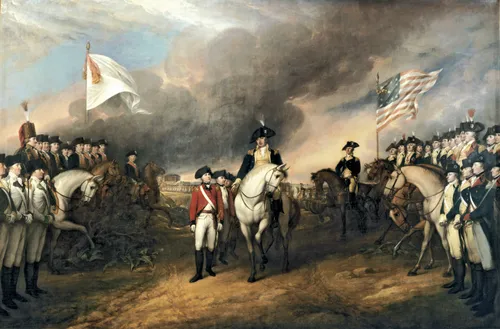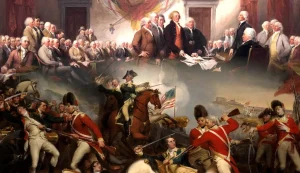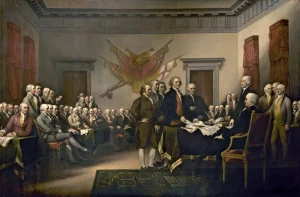
American Revolutionary War History
Before it became an independent country, the area now known as the United States of America was a series of thirteen colonies along the east coast of the North American continent belonging to the Kingdom of Great Britain. These colonies served the same functions as most colonies at the time, and were ruled by British colonists. The colonies at the time of the Revolutionary war - all later to become states - were New Hampshire, Massachusetts, Rhode Island, Connecticut, New York, Pennsylvania, New Jersey, Delaware, Maryland, Virginia, North Carolina, South Carolina, and Georgia.
Background
The Revolution has its roots in the 1760's and 1770's. From 1754 to 1763, the British, along with the American colonists, were at war with France during the Seven Years War, better known in the U.S. as the French and Indian War, in reference to the alliance between the French and several Indian tribes. The war was part of a larger conflict between France and Britain over control of the North American colonies. The French, before the war, had control over Canada, and after the war, Canada went to the British. Though the outcome was a strong victory for a British, it put the British crown into serious debt, resulting in the raising of many, many taxes, as well as the imposition of these taxes on the American colonists. The colonists became upset, as they had fought on the side of the British in the Seven Years War, and had hoped for some sort of reward, rather than a hike in taxes. Additionally, King George III set aside all land west of the Appalachians for the Indians, essentially forbidding the colonists from expanding into these areas, which did not go over well with the Colonists. All of these led into the eventual Revolutionary War.
Political Motivations
Upon the imposition of many of the taxes, Americans began to revolt. Since Americans did not have any representation in the British Parliament, they declared the Stamp Act (the law that imposed the taxes) to be illegitimate, and fought its imposition to the point where most of the taxes were never successfully collected. Additionally, merchants in the colonies were forbidden from doing trade with any other countries - since they were a colony of Britain - and this also led to a desire for independence.
Eventually the colonies wrote and signed the Declaration of Independence, declaring that the states were no longer a part of Great Britain. This document, now one of the most famous in the world, states "We hold these truths to be self-evident, that all men are created equal, that they are endowed by their Creator with certain unalienable Rights, that among these are Life, Liberty and the pursuit of Happiness." This sentence was one of the first governmental statements to be written on the basis of a philosophy of egalitarianism. The United States itself was founded on the idea of democracy and equality which, at the time, was completely unprecedented in a world of dictators and kings, or, as was popular to say at the time, "tyrants."
Beginning of the War
The war itself actually began a full year before the Declaration of Independence. For a while, unrest had been building up in the colonies, often resulting in open riots. In response to one of the taxes, the Tea tax, several colonists boarded a ship bringing tea to the colonies, and dumped it into the Boston Harbor. Another major rallying point was around the Boston Massacre, in 1770, when colonists, who had started harassing a British officer, grew into a large mob which a group of British soldiers then fired upon, killing five. The event was used to foment anti-British sentiment, and turned many against Britain.
The War itself began in April 1775, when British soldiers were sent to take hold of a Patriot-held arsenal in Concord, Massachusetts. A number of patriots who had remained in Boston received intelligence, and two men, William Dawes and Paul Revere, were sent to warn the militiamen of the coming British troops. On April 17, 1775, the British troops arrived in Lexington, Massachusetts. Upon meeting a formation of militiamen, they fired, killing 8 of the Patriots. The militiamen regrouped in Concord, where the battle continued. The British weren't able to find any arsenal, and both in strategic terms and number of casualties, the Colonists won.
Fighting the War
By June of 1775, the Colonists were in control of most of the American colonies, and they began to form separate governments, and created a Continental Congress, which drew up the Declaration of Independence. Now, with the administerial capabilities and the control of the land, the Patriots had an independent government. But at the time the British Empire was the most powerful Empire in the world - and would remain so for another 150 years. The British regrouped, and in July 1776, around the time of the signing of the Declaration, they returned in force. The British launched offensives from Canada to try and cut New England, which they perceived as the main threat, off from the rest of the colonies. The British quickly took New York City and New Jersey with the help of German mercenaries known as Hessians. During a particularly rough winter, General George Washington led the rebel forces into New Jersey in a surprise attack, taking back New Jersey and recharging Patriot Morale. The next year, after defeating the British at Saratoga, the French became convinced that the Americans could win the war, and entered the war as formal allies with the United States, in attempt to further weaken Britain, one of their main rivals.
In fact, alliances with France, Spain, and the Dutch were probably an essential component in America's winning the Revolutionary War. Though the Patriots had something of a home field advantage (ha!) they were completely outgunned by the British. With the help of these other empires - who had interests in removing the British from colonies in the Caribbean and other valuable spots - Americans had the financial and military support that made winning the war possible.
By 1781, the British were more or less defeated, and support for the war had flagged in the British Parliament, and with the Treaty of Paris in 1783, America was officially granted independence and recognized sovereignty.
Building a Government

After the war, many of the states saw themselves as independent entities who had united for the sake of defeating the British, so when the American colonies formed a government, they created a loose confederation under the Articles of Confederation, which gave each individual state total sovereignty over its own affairs, and just provided loose ties to each other. Since nothing could really be done within the Confederation - as no single state was impelled to comply with the orders of the Confederation - these articles were deemed ineffective, and a new constitution was drafted and adopted in 1788, which would become the Constitution of the United States of America. This officially founded the current American government, and the Constitution is still the basis of our government today.
Statue of Liberty
The significance of the Constitution on a worldwide scale is that it create the first ever democratic country on earth. Granted, it was imperfect at the time, because the right to vote was denied to anyone who wasn't a white man, but it was the first government of its kind, and was the first government to be founded on a philosophy rather than a will to power, so to speak. The constitution provided for a Senate, a judiciary, and a President. The first President was George Washington, the General and war hero from the Revolutionary war, who largely set the precedents that kept the President from becoming another king. Over the next 20 years, America would expand hugely in size, with the addition of the Louisiana Purchase, which annexed a large part of the current United States' wilderness west of the Mississippi, and it would go on to inspire revolutions in a number of other countries and colonies - notably, France. Ironically, in the 1950's and 60's, the Vietnamese Communist Revolutionary Ho Chi Minh would famously cite Thomas Jefferson as a major inspiration for his movement, and even started his speech declaring North Vietnam an independent state with "We hold these truths to be self-evident..." Many other revolutions since then have been based around similar ideals to those placed down in the American Declaration of Independence, and the modern Universal Declaration of Human Rights is based in part on the American Constitution's Bill of Rights.
The Constitution did not solve all political issues, however, and for the next 70 years after its adoption, the balance of power between the state and federal level would become a seriously contentious issue, along with the enslavement of millions of Africans in the south, which flew in the face of the founding statement that "All men are created equal." This would come to a climax in 1861, with the breakout of the American Civil War.

